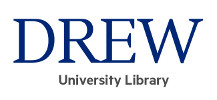 Library Guides
Library Guides Library Guides
Library GuidesArticles, short-form publications, usually in a longer recurring publication, online, or in a book, come in several types:
*HOWEVER: not everything in a peer-reviewed publication is a scholarly article!
Subject specific search options: Drew Library has many options for searching for resources specific to your course subject, your major or minor, or your area of interest. You will get better search results for your project or assignment when using a subject-specific search engine.
Below are links to some subjects associated with Drew's Fall 2022 DSEM topics. Here students will find links to Subject Guides created by our Librarians. Find additional subject-related databases in the "Resources by Subject" LibGuide linked through the Library's Research Resources page. Contact the Library at email: reference@drew.edu if you need any help with these resources.
>>> At Drew Library, we have a search engine named Scholarsearch (not unlike Google) that searches all of our resources for helpful materials for your academic work -- and it even searches outside of our collection. See below for links to videos that describe and demonstrate how it works.
>>> Another good general database to use at Drew Library is ProQuest Central. It looks different because it's not on the EBSCO platform like so many of our academic databases. Give it a try!
>>> For subject-specifc databases (and more focused searches and results), please see next tab in this sub-Guide called "Search Tools by Subject (for DSEMs)" or go to "Resources by Subject."
In general, when searching in academic databases, use these tips to combine search terms
If you are searching in Scholar Search, you will see both books and articles.
Some databases have full text incorporated in them; almost all of our databases, however, are connected to "Find it @Drew" which will check all our electronic journal sources to see if an article is available.
If the articles are directly connected into the database, it will give you a direct link to the PDF or HTML or Linked full text; some items will be not in our collection and you'll be directed to request them through Interlibrary Loan.
For many, you'll need to click Find it @Drew to see whether it's available electronically:

When you click Find it @Drew you will be taken to a page that will offer you a list of links to the resource in our electronic journal holdings. (Sometimes we have a journal article via more than one database; that's why you see multiple links.) Click one of the links to get to the full text:

If we don't have access to the journal/article online, Find it @Drew will give you links
NOTE: The first time you request an article or book via ILLiad (our InterLibraryLoan system), you will be asked to fill out a short form. It may take several days to receive an article via InterLibraryLoan; books can take longer.

Questions? Need Help? Email reference@drew.edu
Drew University Library, http://www.drew.edu/library